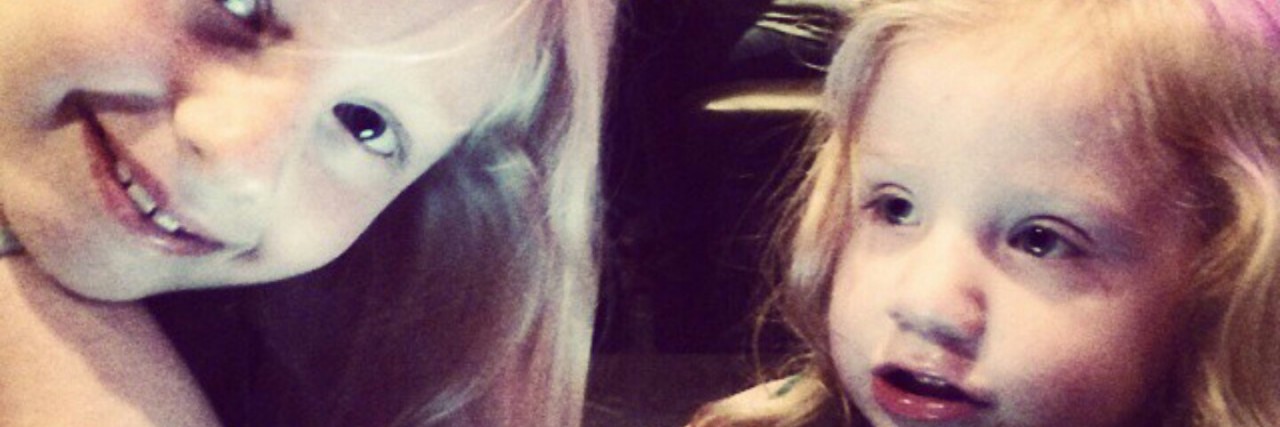
It’s not unheard of for my oldest daughter to worry. It’s actually quite the norm. She is 9 years old and incredibly bright and insightful. These qualities seem to come with a certain degree of personal cost, though. She’s easily overwhelmed and worried by things that wouldn’t register as a blip on the radar for a typical pre-teen. I’ve spent many nights trying my best to calm her fears as she’s sat in bed, worrying about things like the Ebola outbreak and acts of mass violence in school. So, the other day, when I sensed her anxiety and asked her to tell me what was on her mind, I wasn’t expecting her answer to be so deeply personal.
“Mommy, I read in a book that there is no cure for autism. That makes me really sad for Piper.”
For a moment, I was at a complete loss for words. My silence seemed to deepen her sense of worry, and she followed up with “Is that true, Mom? Is she going to be OK?”
Before I could find the right words, my husband carefully explained to her that autism is not a disease and should not be viewed as such. More importantly, he assured her Piper is and will continue to be just fine. This seemed to satisfy her for a moment, but the proverbial wheels were turning. A few minutes later, she pressed us further.
“If it’s not a disease, then what is it?”
By now, I’d recovered enough from my thoughts to add to the conversation.
“People who have autism don’t need to be cured, Kaydie, because there is nothing ‘wrong’ with them,” I offered. “They just experience and process things differently. Instead of searching for a cure or a fix for something that isn’t broken, there needs to be a greater effort to understand how people like Piper see the world. Then, we can learn to relate and communicate in a way everyone understands.”
I went on to explain that Piper spends so much time in therapy not in an effort to be cured, but rather, because she was having difficulty showing and telling us how she was feeling. I did my best to explain that helping Piper express her thoughts and feelings is an important part of understanding autism, as a whole.
I hoped, in that moment, this was enough of a learning experience to ease her anxiety over her sister’s future. It seemed to be. She went back to the movie she’d been watching with her siblings, seemingly satisfied with the conversation.
I was the one left exhausted and saddened by this brief exchange. Even though campaigns for autism awareness are everywhere, this conversation left me feeling like we’re fighting an uphill battle. Where, as human beings, are we getting this so wrong? My 9-year-old is a literal thinker, and therefore asks questions about things that don’t make sense to her. How many other 9-year-olds are reading the same literature she read? How many of them stumble upon misinformation like this, take it at face value, and view autism as some kind of incurable disease? If anything scares me about Piper’s future, it is this type of mentality.
Perhaps some of the efforts to raise awareness are misguided. Is it possible we are focusing so much on educating this generation of parents that we are forgetting our children’s generation needs educating, too? As parents of children with autism, we are a community with a voice getting collectively louder and in doing so, gaining much needed attention. But how can we expect our children to be the next generation of advocates if we are not enabling them to understand, as well?
If there is one thing I wish people would stop getting so wrong about autism, it is the notion that those who have it are “suffering” or somehow broken.
I truly believe it’s time we redirect our call for awareness to include our young children. Equally if not more important, we must reach their classmates who have had no firsthand exposure to autism.
If there is a lesson to be learned here, it is this: It will be far easier to plan carefully and to lay a foundation which educates children correctly from the beginning than it will be to try to change their mindset later in life. We’re currently fighting our hardest to break through the barrier of preconceived notions about autism. If we don’t give our children a better starting point, we will never progress past this point, ourselves. We will merely pass along to them the same obstacles we are fighting so hard to overcome today.
The Mighty is asking the following: How would you describe your disability, disease or mental illness to a child? Check out our Submit a Story page for more about our submission guidelines.

